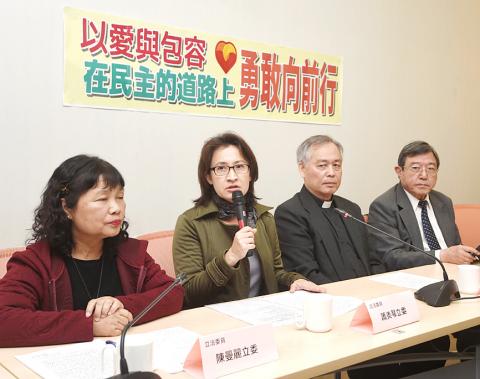The Presbyterian Church in Taiwan yesterday urged the government to make moves toward formal independence to safeguard the nation’s freedom and democracy against Chinese infiltration.
“We must adopt a Taiwan-centric way of thinking and remain united as Beijing attempts to infiltrate and divide us in all kinds of ways,” the church said in a statement read by its general secretary Lyim Hong-tiong (林芳仲) at a news conference.
Now is a critical time for Taiwanese to forge ahead and work toward joining the international community, the statement said.

Photo: Fang Pin-chao, Taipei Times
“We must continue to try and join international organizations in the name of ‘Taiwan,’” the church said.
The church urged Taiwanese to “leave all bias behind, and instead embrace love and tolerance to help Taiwan overcome threats and isolation from China, and move toward becoming a new and independent nation.”
The Nov. 24 elections saw China attempting to “manipulate Taiwan’s democracy” by taking advantage of its democratic system, it said.
Taiwanese should consider developing mechanisms of a so-called “defensive democracy” to better protect their freedom and democracy, the church said.
To prevent fake news from being circulated, everyone should learn to judge the authenticity of news and not disseminate untrue information, it said.
The media in particular should adhere to professional ethics and fact-check news stories before publishing them, it added.
The church in 1977 issued a human rights declaration calling on the government to “make Taiwan a new and independent nation,” church moderator Hsieh Po-tsan (薛伯讚) told the news conference.
Forty-one years after the declaration, Taiwan has become a democracy with its own armed forces, territory and a president directly elected by the public, he said.
The church has decided to issue the new statement out of concern over China’s incessant threats to Taiwan’s democracy, he said.
Authoritarian rulers who wish to avoid democratization often attack democracies by using their openness and vulnerability, Lyim said.
Taiwan’s democracy has become a target for Beijing because it poses a threat to its authoritarianism, he said, adding that the nation should improve mechanisms of defensive democracy through legislation, he said, as the US, Japan and Australia had done.
The Chinese government has been using Taiwan’s democratic values to “destroy our democratic diversity and freedom of speech,” Democratic Progressive Party Legislator Wang Ting-yu (王定宇) said.
Considering the events in Crimea and southern Vietnam, and given that Taiwan’s democracy is under far more serious pressure than the US or European nations, building more defensive mechanisms is worth considering, he said.

Taipei has once again made it to the top 100 in Oxford Economics’ Global Cities Index 2025 report, moving up five places from last year to 60. The annual index, which was published last month, evaluated 1,000 of the most populated metropolises based on five indices — economics, human capital, quality of life, environment and governance. New York maintained its top spot this year, placing first in the economics index thanks to the strength of its vibrant financial industry and economic stability. Taipei ranked 263rd in economics, 44th in human capital, 15th in quality of life, 284th for environment and 75th in governance,

Greenpeace yesterday said that it is to appeal a decision last month by the Taipei High Administrative Court to dismiss its 2021 lawsuit against the Ministry of Economic Affairs over “loose” regulations governing major corporate electricity consumers. The climate-related lawsuit — the first of its kind in Taiwan — sought to require the government to enforce higher green energy thresholds on major corporations to reduce emissions in light of climate change and an uptick in extreme weather. The suit, filed by Greenpeace East Asia, the Environmental Jurists Association and four individual plaintiffs, was dismissed on May 8 following four years of litigation. The

A former officer in China’s People’s Liberation Army (PLA) who witnessed the aftermath of the 1989 Tiananmen Square massacre has warned that Taiwan could face a similar fate if China attempts to unify the country by force. Li Xiaoming (李曉明), who was deployed to Beijing as a junior officer during the crackdown, said Taiwanese people should study the massacre carefully, because it offers a glimpse of what Beijing is willing to do to suppress dissent. “What happened in Tiananmen Square could happen in Taiwan too,” Li told CNA in a May 22 interview, ahead of the massacre’s 36th anniversary. “If Taiwanese students or

The New Taipei City Government would assist relatives of those killed or injured in last month’s car-ramming incident in Sansia District (三峽) to secure compensation, Mayor Hou You-yi (侯友宜) said yesterday, two days after the driver died in a hospital. “The city government will do its best to help the relatives of the car crash incident seek compensation,” Hou said. The mayor also said that the city’s Legal Affairs, Education and Social Welfare departments have established a joint mechanism to “provide coordinated assistance” to victims and their families. Three people were killed and 12 injured when a car plowed into schoolchildren and their